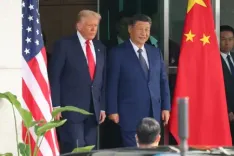US Financial Markets Decline as Dollar Weakens Amid Trump Tariffs

Synopsis
Key Takeaways
- US markets hit a two-year low.
- Trump's tariffs affect over 100 countries.
- Dow fell by 1300 points, Nasdaq by 4.8%.
- Canada and Mexico exempt from new tariffs.
- Trade deficit and practices are major concerns.
Washington, April 4 (NationPress) US financial markets declined on Thursday, reaching their lowest point in two years, following President Donald Trump’s extensive tariffs on imports from all trading partner nations. Concurrently, the US dollar fell to its weakest level.
The Wall Street Journal noted that the US market had a market capitalization of $2.7 trillion by noon. At that time, the Dow Jones Industrial Average had dropped by 1300 points, or 3.1 percent, while the tech-focused Nasdaq experienced a decline of 4.8 percent.
On Wednesday, President Trump announced significant tariffs on imports from over 100 countries. The baseline rate stands at 10 percent, with higher, country-specific tariffs applied to several trading partners, including India (26 percent), China (34 percent), and the EU (20 percent).
Other nations facing increased tariffs include the UK (10 percent), Japan, South Korea, Indonesia, Taiwan, the EU, Vietnam, Cambodia, Switzerland, Bangladesh, Pakistan, and Sri Lanka.
Many of these targeted nations are treaty allies of the US, as the President stated, asserting that friends have been more unfair to the US on trade issues than foes.
He also reiterated his ongoing concerns about countries with significant trade surpluses with the US or those he views as imposing high import duties on American goods.
While Canada and Mexico are exempt from the reciprocal tariffs, imports from these countries already face a 25 percent levy previously announced by Trump to curb the flow of illegal migrants and fentanyl, a potent opioid, across their borders into the US.
The reciprocal tariffs mark the fourth in a series of measures implemented by President Trump to reduce America's trade deficit, challenge restrictive trade practices, and encourage manufacturers to relocate to the US.
In the initial round, he reinstated a 25 percent tariff on steel and aluminum imports from his first term, raising the aluminum levy from 15 percent.
This was followed by tariffs on Canada, Mexico, and China (as a source for precursor chemicals for fentanyl). Next came the 25 percent tariff on imported automobiles and auto parts, with plans for future tariffs on pharmaceuticals.










